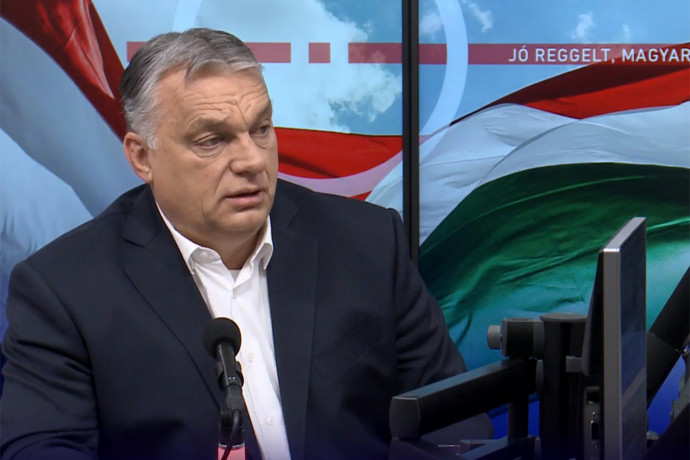Orbán’s weekly radio interview: NATO will only protect us if we protect ourselves

Every Friday, Hungary’s prime minister gives an interview on one of the state-owned radio stations. Since the independent media has not had a chance to interview him for many years, these weekly radio interviews are the only opportunity to find out what the leader of the country thinks about current events, how he sees his opponents and any issues at hand. From now on, every Friday, Telex English will bring you a 3-point summary of the main issues discussed that morning. This week’s three points are: The EU and crisis management, how the war in Ukraine is affecting Hungary and Europe, and what Orbán thinks about EU sanctions against Russia.
On the EU’s crisis management: If you want someone to (just) talk, you can always count on Brussels
According to Orbán, all Brussels does is talk, and actions have been left to the nation-states to take care of.
“To be honest with you, I have no idea what on earth Brussels is doing.”
-he said, criticizing the European Union. In his opinion, the Hungarian government is the only one doing anything. Hungary has been defending the border, we have been the ones providing for those who are truly fleeing wars. In the current humanitarian catastrophe we cannot afford to wait for the EU’s support, as Brussels still hasn’t sent any money, any support for the fence we had built to protect the Hungarian borders.
If you are not strong on your own, you don’t have any allies
Orbán further said that Germany’s announcement of building up its military will reshape the political situation in world politics. “This was a big thing for Germany. In a few years’ time, we will be living in a different Europe.” – he said. According to him, even though a war next door is never a good thing, all that is currently happening justifies the recent development of the Hungarian armed forces and the government's decisions. “There is no peace for a weakling” – he said, adding that to be at peace, one needs their own strength as well as allies.
“NATO will only protect us if we are ready to defend ourselves. Anybody who thinks that NATO will protect us just like that is wrong.”
– he declared. In his opinion, in 2010, (when he came to power with a two-thirds majority) the country was broke, and there was a lot to be done before they were able to begin developing the Hungarian military. At first, the rebuilding of the military was not the priority. Instead they focused on the well-being of Hungarian families, limiting overhead costs, and assisting those who had taken foreign currency loans. And then the migration wave hit us, so the development of the military started – all the while being attacked by those on the left. But it is thanks to this that the situation now is not as bad as it was ten years ago:
„We are now strong enough to – with the help of our allies – ensure our own safety.”
According to Orbán, thanks to the government’s hard work, no trouble can befall Hungary now, except if the left keeps making irresponsible, incoherent statements. It is no accident therefore that he is advising everyone to strive for strategic calmness, as the war going on next door could have various endings.
“One can try to be smart about geopolitics and security, but above all arguments, there are people who are dying. And it is easy to make a mistake in such a distressed situation. That is why calm, thought-out decisions are needed.”
A few hours later, Ukraine’s ambassador to Budapest, Nepop Ljubov responded to Orbán’s call for “strategic calmness” as Russia invades her country, and said:
“Strategic calmness is what will be in the grave.”
We are part of the West
In his radio interview Orbán criticized the EU’s economic sanctions imposed on Russia. In his opinion, this was a decision of the West, and although Hungary had previously expressed its concerns about the efficiency of these, since “we are in the end, part of the West”, we went along with these joint decisions.
In spite of this, Orbán again spoke about the importance of protecting the overhead prices for the benefit of Hungarian families, and fending off the danger of high inflation which would be caused by the rise in energy prices.
According to the prime minister, the war is not only affecting Hungary’s political situation, it will also be hard on the economies of both Hungary and all of Europe, as all European investments need to be recalculated now – but these things cannot be clearly seen as of yet.
“It all depends when the war will end. The sooner it ends, the less trouble we will have to face. It’s in Hungary’s interest to be for peace” -he said, adding that Hungary has always been for peace, as any sanctions will be affecting us as well, and all the effects of war cannot be ascertained yet. In the past years we have done all we could to avoid war, but “this is all we were able to do” – he concluded.
Viktor Orbán avoids critical questions at home. It’s been years since he gave an interview to independent media. However, for years, every Friday morning he has been a regular guest on state-owned Kossuth Rádió, where he is interviewed by a leading editor of the public broadcasting service (operating from an annual budget of 320 millions of euros). Katalin Nagy has been almost exclusively the only person to be allowed to interview Orbán on the state-owned channel throughout his third term with a two-thirds majority in parliament. She has received the state decoration of the Cross of the Order of Merit of Hungary and doesn’t shy away from asking questions.